Flammable Bulk Liquid Transportation
For
companies that work with dangerous materials and goods, it becomes harder to
manage when they’re flammable liquids. Since combustible and flammable liquids
burn, they pose a greater risk of property damage and personal injury. That’s
where regulations exist to govern their storage, labeling, and transportation
modes-rail, air, and water.
If
you deal with bulk liquid transportation, dependable bulk transportation is a
major concern. After all, too many things could go wrong that could have a
dramatic impact on significant business relations. Here’s what you need to know
about flammable bulk liquid transportation.
Labeling
When
undertaking bulk liquid transportation, proper container labeling is important
for combustible and flammable liquids. This helps prevent accidental mixing of
chemicals and decreases the likelihood of mistaking one liquid with another.
You’ll
need to mark the liquid name plainly and its hazard on the storage container.
Ensure the label is clean so that it’s easily visible at all times. It’s worth
noting that you shouldn’t use a container for any liquid except the one that’s
marked on the label.
You
want to avoid inappropriate containers, for instance, buckets because you’ll
discover that open containers permit the escape of dangerous vapors. On the
same note, breakable containers enhance the likelihood of serious spills.
Storage Restrictions
Since
their vapors burn and ignite easily, combustible and flammable liquids have
stringent storage requirements before bulk liquid transport. Some of the
requirements include:
- Only portable tanks and
approved containers should work for handling and storing flammable
liquids.
- The construction of storage
rooms should meet the prerequisite fire-resistive rating and the
construction should comply with the test requirements.
Transportation Restrictions
Due
to the hazardous nature of flammable liquids, the guidelines for transporting
flammable liquids are rather extensive. Some of the requirements include:
- Only permitted containers
and tanks should work for storing and transporting flammable liquids
- Portable tanks should
include room for emergency vents that can work to reduce internal pressure
during fire exposure. Furthermore, they should feature at least a pressure-activated
vent
- Shipments should comprise
MSDS sheets and have appropriate labeling during bulk liquid
transportation.
- Bigger shipments should
comprise MSDS sheets, a hazmat lading bill, and an emergency response
guide.
Containers for Use
When
possible, use properly labeled and approved safety containers when providing bulk
liquid solutions. Approved containers are those that have undergone approval by
testing laboratories. Approved containers include:
Safety Cans
Portable
cans for storing, transporting, and dispensing combustible and flammable
liquids have wide usage. They’re accessible in various capacities, shapes, and approved
cans are metal-made or feature low-conductivity plastic.
Safety
cans also comprise spring-mounted caps, which open automatically once the vapor
pressure accumulates inside, to permit vapors to escape and avoid a rupture in
case of fire. The cap-operating mechanisms cause automatic closing of the spout
cap once you finish pouring or filling from the safety can.
Beware
that this safety element could generate a hazard under certain conditions. In a
warm, enclosed setting, for instance, a vehicle trunk, it’s possible to find
vapors venting from a safety can attaining flammable levels. Consequently, an
explosion could arise from a spark.
For
temporary bulk liquid transport of small quantities of flammable liquid, adopt
a non-venting and approved pressure-resistant container. On the same note, you
should eradicate ignition sources and maintain good ventilation.
Factors to Consider When
Selecting Bulk Transportation Carrier
Safety Standards
When
it comes to product handling, you want to work with a company that will
prioritize safety. This is particularly recommended for food products. Reliable
liquid bulk transport companies should explain their safety standards before
making any delivery.
Reliability
The
company you choose to provide bulk liquid solutions should be reliable. You’ll
discover that experience is crucial to the reliability, so the chosen company
should have the necessary procedures in place. They should also have procedures
for handling emergencies and routines.
Personalized Service
Businesses
aren’t equal. After all, some need trucking; others require air transportation,
while others require ships. Over time, your transportation needs might change
in which case you’ll need a transportation company that provides versatile
options. For instance, if you require food shipment from one storage facility
to the next, you require refrigerated transport. Therefore, working with a
transport company that offers versatile options will save you money and time.
Growth
Although
trucking is the most common transport mode, air and rail also have a
significant role, particularly in international shipping.
A
bulk transportation company must have a global network of relations that can
help your business grow. Furthermore, not all vessels can accommodate the same
product quantity. To maximize your load, you require options. Therefore, you
require tailored services to ensure efficient delivery.
Affordability
Cost
is a significant factor when determining the transport mode to use for bulk
products. Bulk transportation cost is reliant on the number and size of
products being transported along with the traveled distance.
The
kind of products also impacts the total cost because some items will be subject
to some limitations. Although cost is among the most salient factors, you
should consider it together with reliability, efficiency, and the carrier’s
trustworthiness.
The Nature of Goods
Along
with the cost, you should consider the kind of products being shipped if you’re
keen on shipping bulk items when establishing a carrier. For safety purposes,
the FDA enforces tight restrictions on how the transportation of certain goods
can occur.
Fragile
or dangerous items need care during transportation. Therefore, the
transportation of certain products can only occur in specific cars. Other kinds
of products are better suited for certain kinds of transportation because of
the insurance issued by the carrier. When it comes to perishables with
restricted shelf lives, transportation should occur using the fastest shipping
method.
If you’re looking to transport flammable bulk liquids you must familiarize yourself with the associated guidelines to ensure a successful outcome.




Comments
Post a Comment